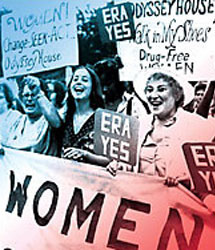 |
 |
 |
 News from Around the Americas | July 2006 News from Around the Americas | July 2006  
Voting Rights Act Extension Approved in US Senate, 98 to 0
 Charles Babington - Washington Post Charles Babington - Washington Post


| | Former New York congresswoman Bella Abzug (right) joined 4,000 marchers in New York City on August 27, 1980, in support of the Equal Rights Amendment and in celebration of the 60th anniversary of the 19th Amendment, which gave women the vote. This weekend, the victories and challenges of the past and today will be discussed in Albany, New York, where more than 800 members of the National Organization for Women will will observe a milestone: NOW's 40th anniversary. (Perry Ashe/UPI) |
Washington — The Senate voted 98 to 0 to renew key provisions of the Voting Rights Act yesterday, permitting the federal government to continue its broad oversight of state voting procedures for the next quarter-century, and allowing Republicans to claim equality with Democrats in protecting minorities' clout at the ballot box.

The act requires several states, mostly in the South, to obtain Justice Department approval before changing precinct boundaries, polling places, legislative districts, ballot formats and other voting procedures. It also requires many jurisdictions throughout the nation to provide bilingual ballots or interpreters for voters whose English is not strong.

Those two provisions caused a mini-revolt among House Republicans last week. GOP leaders had to scramble - and rely on heavy Democratic support - to defeat proposed amendments that they said would dilute the bill and prove politically embarrassing.

The law, first passed in 1965, retains near-iconic status in civil rights circles - even though some elected officials say it is no longer needed. GOP leaders were eager to renew it before the November elections. Unlike the House, where some Southern Republicans opposed provisions that focus on their states, the Senate passed the bill unanimously after hours of one-sided debate in which member after member praised leaders of the 1960s desegregation movement.

President Bush, addressing the NAACP's annual convention while the debate was underway, said, he looked forward to signing the measure. "A generation of Americans that has grown up in the last few decades may not appreciate what this act has meant," he said. "Condi Rice understands what this act has meant," Bush said, referring to the secretary of state, an African American who grew up in Alabama in the 1950s and '60s.

The disharmony evident during the House's deliberations on the act barely touched yesterday's Senate proceedings, in which lawmakers from both parties and all regions agreed that the Voting Rights Act remains pertinent and necessary. Several black House members - including Rep. John Lewis (D-Ga.), who worked alongside Martin Luther King Jr. in the 1960s - were on the Senate floor for the vote. Sen. Edward M. Kennedy (D-Mass.) shook hands with Rep. Melvin Watt (D-N.C.), chairman of the Congressional Black Caucus, when the result was announced.

"As we reflect on the true wrongs that existed in the 1950s and 1960s and where those wrongs may have taken place, we owe it to history . . . to pay tribute to those who took the law and made it a reality," Sen. Johnny Isakson (R-Ga.), whose House colleagues led the opposition in the other chamber, said during the debate.

Sen. Saxby Chambliss (R-Ga.) was a bit more grudging. "While I support this bill, I continue to have some serious concerns with several aspects of it," including its "extension for an extraordinary 25 years," he said from the floor. The defeated House amendments, he said, "would have strengthened this bill and updated it to reflect the reality of profoundly improved race relations" in Georgia.

The act, originally signed by President Lyndon B. Johnson, outlawed practices such as poll taxes and literacy tests that many Southern jurisdictions used to depress black voter turnout. As amended over the years, it required such jurisdictions to obtain federal "pre-clearance" for an array of voting-related practices that might have the effect of reducing minority voters' influence.

Some local and national officials say the targeted oversight is no longer justified and is a relic of days when Southern states could not be trusted to treat all citizens justly. But others say abuses still occur. "Where would the citizens of Georgia be - particularly low-income and minority citizens - if they were required to produce a government-issued identification or pay $20 every five years in order to vote?" Sen. John F. Kerry (D-Mass.) asked in reference to measures approved by the Georgia legislature but challenged in federal courts under the Voting Rights Act.

Civil rights activist Jesse L. Jackson said in an interview that the Senate vote called for "restrained celebration," because the Bush administration's Justice Department has shown tepid enthusiasm for enforcing the voting law. "This Justice Department, right down the line, has chosen states' rights," Jackson said.

Senate Majority Leader Bill Frist (R-Tenn.) called the vote a major success. "The Voting Rights Act has worked," he said. "We need to build upon that progress by extending expiring provisions."

Sen. Patrick J. Leahy (D-Vt.) called the act "the cornerstone of our civil rights laws. We honor those who fought through the years for equality by extending the Voting Rights Act to ensure that their struggles are not forsaken and not forgotten, and that the progress we have made not be sacrificed."

Caroline Fredrickson, director of the ACLU's Washington Legislative Office, praised the extension of the law's key provisions and urged vigilant enforcement.

"We must look ahead to make sure the promise is as true and strong as it was in 1965," she said. "Malicious attempts by lawmakers to derail reauthorization show the continuing need for this law and its enforcement." She urged Bush "to sign this legislation as soon as possible." | 
 | |
 |



